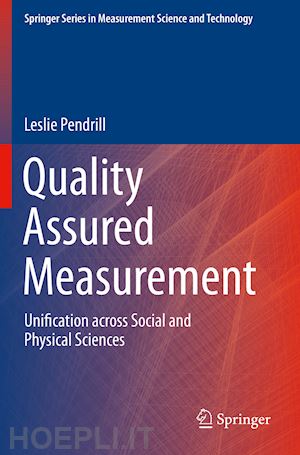
Questo prodotto usufruisce delle SPEDIZIONI GRATIS
selezionando l'opzione Corriere Veloce in fase di ordine.
Pagabile anche con Carta della cultura giovani e del merito, 18App Bonus Cultura e Carta del Docente
This book presents a general and comprehensive framework for the assurance of quality in measurements. Written by a foremost expert in the field, the text reflects an on-going international effort to extend traditional quality assured measurement, rooted in fundamental physics and the SI, to include non-physical areas such as person-centred care and the social sciences more generally. Chapter by chapter, the book follows the measurement quality assurance loop, based on Deming’s work. The author enhances this quality assurance cycle with insights from recent research, including work on the politics and philosophy of metrology, the new SI, quantitative and qualitative scales and entropy, decision risks and uncertainty when addressing human challenges, Man as a Measurement Instrument, and Psychometry and Person-centred care.
Quality Assured Measurement: Unification across Social and Physical Sciences provides students and researchers in physics, chemistry, engineering, medicine and the social sciences with practical guidance on designing, implementing and applying a quality-assured measurement while engaging readers in the most novel and expansive areas of contemporary measurement research.
Chapter 1: Measurement challenge: specification and design
1.1 Processes of production and measurement
1.2 Measurement, assessment, opinions – from quantitative observations to categorization
1.3 Opening the quality-assurance loop
1.4 Specification of measurement problem
1.5 Case study: Fit-for-purpose measurement specification
Chapter 2: Measurement method and system development
2.1 Design of experiments
2.2 Specification of demands on a measurement system
2.3 Choice and development of a measurement method
2.4 Measurement System Analysis
2.5 Evaluation and validation of a measurement method
2.6 Verification
2.7 Case studies
Chapter 3: Ensuring traceability
3.1 Quantity calculus
3.2 Units and symmetry, conservation laws and minimum entropy
3.3 Calibration, accuracy and true values
3.4 Politics and philosophy of metrology
3.5 Quantitative and qualitative scales
3.6 New and future measurement units
Chapter 4: Measurement
4.1 Performing measurements
4.2 Metrological confirmation
4.3 Case study: Example of measurements
Chapter 5: Measurement report and presentation
5.1 Presentation of measurement results
5.2 Modelling measurement principle
5.3 Case studies
Chapter 6: Decisions about product
6.1 Use of measurement results and conformity assessment
6.2 Closing the quality-assurance loop
6.3 Optimised uncertainties, impact and measurement costs, pragmatic extensions of significance testing
6.4 Risks of incorrect decisions and relation to measurement uncertainty
6.5 Qualitative measurement and entropy
6.6 Case studies
Professor Leslie R. Pendrill has for much of his career since the mid 1980’s been head of research at the National Metrology Institute of RISE Research Institutes of Sweden. For decades, his research has focused on fundamental metrology, in particular optoelectronic, laser, length and mass measurement. More recently, he has developed new quality-assured measurement methods in which Man is the main actor, weighing the effects of measurement against the effects of product evaluations, including optimised measurement, uncertainty studies and the measurement of perception. Professor Pendrill has been actively involved in several international metrology activities including being Chair of the European Association of National Metrology Institutes (EURAMET); the International Union of Pure and Applied Physics’ Commission on Symbols, Units, Nomenclature, Atomic Masses and Fundamental Constants; and the ISO/TC12 Quantities and units standards committee. He earned his PhD in Atomic Physics at the University of Reading, England and moved to Sweden after postdoctoral positions in Paris at the École normale supérieure, JILA Research Institute in Boulder CO, and Oxford University.











Il sito utilizza cookie ed altri strumenti di tracciamento che raccolgono informazioni dal dispositivo dell’utente. Oltre ai cookie tecnici ed analitici aggregati, strettamente necessari per il funzionamento di questo sito web, previo consenso dell’utente possono essere installati cookie di profilazione e marketing e cookie dei social media. Cliccando su “Accetto tutti i cookie” saranno attivate tutte le categorie di cookie. Per accettare solo deterninate categorie di cookie, cliccare invece su “Impostazioni cookie”. Chiudendo il banner o continuando a navigare saranno installati solo cookie tecnici. Per maggiori dettagli, consultare la Cookie Policy.